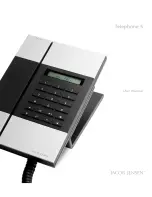
3
Congratulations on the purchase of your new
JACOB JENSEN
TM
Telephone.
The telephone is designed in Denmark by Jacob Jensen, whose
products have gained international recognition for their original,
simple and classic design. Jacob Jensen has received around 100
prizes from around the world and has 19 products included in The
Design Study Collection and The Design Collection of The Museum of
Modern Art in New York.
The
JACOB JENSEN
TM
Telephone 5 is suitable for connection to the
public network and works with most PABX switching systems (please
consult your switching system provider for details). The telephone
can either stand or be mounted on the wall and is equipped with
a caller ID function for storing up to 80 numbers. The telephone
is further equipped with a mute function in the handset, on hook
dialling, HI/LOW volume adjustment for the ringing tone, the
handset receiver and for on hook dialling.
Installation
Table stand
The telephone is supplied with a table stand which you attach as the
following (see description on page 6):
1. Slide the canals of the table stand into the tracks of the base.
The table stand is mounted when you hear a click.
. Fit the modular contact of the coiled cord into the plug of the
telephone and handset.
3. There are two telephone line cords enclosed.
Connect the wide line cord to the base and to the battery
compartment (OUT). Connect the narrow line cord to the battery
compartment (IN) and to the telephone wall outlet.
Wall mounting
The telephone can be mounted on the wall as follows:
1. Disconnect the coiled cord and the wide line cord from the base.
. Push the button inside the square hole next to the modular jack
using a pen or a finger, and pull the bracket away from the base at
the same time.
3. Place the telephone on the screws already mounted on the wall
(use the template on page 5).
4. Reconnect the coiled cord and the telephone line cord to the base.
Fixing and replacing batteries
The Telephone 5 requires four pcs. AA batteries (included).
To replace the batteries please as follows:
1. Disconnect the wide and the narrow line cord from the battery
compartment.
. Open the battery compartment.
3. Install four fresh batteries as indicated by the polarity symbols (+/-).
4. Close the battery compartment and reconnect the wide and the
narrow line cord.
Note: When replacing the batteries the date and time must be set
again. Please see the description below.
Setting date/time / LCD contrast/ LDS/ area code/ Flash time
Leave the handset on hook when setting date and time.
1. Press
. The month segment starts to flash.
. Press
in order to set the month.
3. Confirm by pressing
. Now the date segment starts to flash.
4. Press
in order to set the date, confirm by pressing
and
the time segment flashes.
5. Continue this process for setting time and minutes.
6. When the correct date and time is set, confirm by pressing
again.
7. After setting date and time, you may select the LCD contrast level
by pressing
. When the desired LCD contrast is shown push
to confirm.
8. After setting the LCD contrast you may set the LDS
(Long Distance Code) and Area Code. The cursor will flash from
first digit. Press
to adjust and
to move to next digit.
NOTE: It is highly recommended that users from larger countries
with many states or provinces like USA, China etc., carefully read
this section for efficient use of the phone.
When the setting of “Long Distance Code” and “Area Code”
match with those of the incoming call, these codes will not
be stored in the Caller ID memory and outgoing calls to these
numbers can be made directly from the Caller ID memory without
dialling the Long Distance Code and the Area code.
9. After setting the LDS and Area Code, the LCD displays the standard
European flash time (F100 = 100 ms). If needed, you may change
the flash time (100 ms/10 ms/300 ms/ 600 ms) - consult your
network provider for details. Press
and
to confirm. The
display now returns to standby mode.
How to make a telephone call
To lift off the handset, gently press on the upper part of the handset
with your index finger and the handset falls into your hand.
a. Lift off the handset and wait for the dialling tone.
b. Dial the telephone number.
c. Put down the handset when the conversation is over.
On hook dialling
It is possible to make on hook dialling till the call is answered:
a. Press
and wait for the tone signal.
b. Enter the telephone number.
c. Pick up the handset when the call is answered.
d. Put down the handset when the conversation is over.
Talking timer
When you make a telephone call the telephone displays the duration
of the call. The timer starts to count shortly after the call is begun.
When the handset is put down the timer automatically reverts to
standby mode.
Message waiting
When one or more messages are recorded the telephone displays
. The symbol is automatically deleted when the message is
tapped.
Note: The Message waiting function requires that your telephone
line is provided with Message/Answer from the network provider.
Caller ID
The telephone is equipped with a caller ID, which shows and stores
the number of in-coming calls. The number is displayed immediately
after the first ring.
The caller ID is able to store up to 80 numbers. When the memory
is full the oldest numbers are automatically replaced by the new
numbers.
Note: The caller ID function requires that your telephone line is
provided with caller ID function from the network provider.
To view caller ID memories
Use the
to scroll between the numbers in the caller ID
memory.
The telephone number with date and time for the call is displayed.
US


























